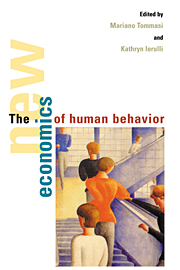Book contents
- Frontmatter
- Contents
- Contributors
- Preface
- Introduction
- PART I DISCRIMINATION AND IMMIGRATION
- PART II CRIME, PUNISHMENT, AND RIGHTS
- PART III ALL IN THE FAMILY
- PART IV GOVERNMENT AND POLITICS
- PART V HEALTH, RELIGION, AND MASS BEHAVIOR
- 10 The economic approach to addictive behavior
- 11 Household production, human capital, and the economics of religion
- 12 The blind leading the blind: social influence, fads, and informational cascades
- 13 Public health and economic epidemiology
- Index
13 - Public health and economic epidemiology
Published online by Cambridge University Press: 03 December 2009
- Frontmatter
- Contents
- Contributors
- Preface
- Introduction
- PART I DISCRIMINATION AND IMMIGRATION
- PART II CRIME, PUNISHMENT, AND RIGHTS
- PART III ALL IN THE FAMILY
- PART IV GOVERNMENT AND POLITICS
- PART V HEALTH, RELIGION, AND MASS BEHAVIOR
- 10 The economic approach to addictive behavior
- 11 Household production, human capital, and the economics of religion
- 12 The blind leading the blind: social influence, fads, and informational cascades
- 13 Public health and economic epidemiology
- Index
Summary
Introduction
The public control of infectious disease is often argued to be one of the main achievements of modern medicine and public health. Recently, the surging AIDS epidemic as well as measles and treatment-resistant tuberculosis epidemics have again made such control a concern in many developed countries including the United States. Moreover, the enormous mortality and morbidity caused by infectious disease in developing nations has always put this public health problem at the forefront of public policy. The importance of this topic is demonstrated by the fact that infectious disease is currently the number-one cause of mortality in the world.
Epidemiology is commonly defined as the study of the occurrence of diseases, whether infectious or not, across populations, areas, and times. Economic epidemiology studies the same class of phenomena, but differs from other approaches by attempting to determine the underlying forces leading to the transmittive choices made by individuals in the population where the disease is located. This article discusses the contribution this approach has made so far over the main existing approach, mathematical epidemiology, in explaining actual disease behavior and the effects that alternative public health measures may have in their attempts to limit the spread of infectious diseases.
The analysis of infectious disease joins the many other areas, including law and sociology, that the imperial science of economics, led in part by Gary Becker, has attempted to develop beyond their existing paradigms.
- Type
- Chapter
- Information
- The New Economics of Human Behaviour , pp. 216 - 234Publisher: Cambridge University PressPrint publication year: 1995



